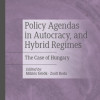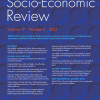Mid-term strategic plan of the Institute for Political Science (summary)
Leading the way in domestic political science: the Institute for Political Science has achieved outstanding publication performance in international journals between 2019 and 2022
Latest news

Hungarian Comparative Agendas Project's new book entitled Policy Agendas in Autocracy, and Hybrid Regimes. The Case of Hungary (eds. Miklós Sebők and Zsolt Boda) has been published by Palgrave Macmillan.

Miklós Sebők and Jasper Simons’ new article entitled ’How Orbán won? Neoliberal disenchantment and the grand strategy of financial nationalism to reconstruct capitalism and regain autonomy’ has been published in Oxford University Press.
.jpg&w=100&h=100&zc=1)
New publication by Veronika Patkós. Several scholars have suggested that political dividedness has harmful effects on economic performance. Interestingly, empirical tests tackling this argument are almost entirely absent.

Eszter Farkas's article entitled “Discussing immigration in an illiberal media environment: Hungarian political scientists about the migration crisis in online public discourses" has been published in European Political Science.

Márton Bene article entitled “Who reaps the benefits? A cross-country investigation of the absolute and relative normalization and equalization theses in the 2019 European Parliament elections" has been published in New Media & Society.
Latest posts

In the fifth pti memo blog post, we report on a lecture by Boglárka Koller, in which she presented her project titled "Cultivating Our European Resilience and Evolution" (CORE) and its significance. Boglárka Koller is the Head of the Department of European Studies at the University of Public Service, Senior Research Fellow at the Centre for Economic and Regional Studies (KRTK), and Jean Monnet Chair. The lecture was hosted by the HUN-REN CSS Institute for Political Science on May 22, 2025, as part of its Speaker Series.

The latest post of the pti memo blog series offers insights from a thought-provoking lecture by Murat Somer, Professor of Political Science and International Relations at Özyeğin University Istanbul and Research Affiliate at the Democracy Institute of the Central European University. Titled "Quo Vadis in Turkey and Implications for Democracy in the World", the lecture explored current political developments in Turkey and their broader implications on combating democratic backsliding. The event took place on May 8, 2025, as part of the HUN-REN CSS Institute for Political Science’s Speaker Series.

The third blog post of the pti memo series summarises the lecture of Dr. Matthew Edward Bergman, Assistant Professor at Corvinus University of Budapest, titled “Ideological Conflict, Logrolling, and Policy Reform: An Analysis of Government Declarations in Western Europe.” The event was organised as part of the HUN-REN Institute for Political Science’s Speaker Series on April 10, 2025. This research, conducted jointly with Hanna Bäck (Lund University) and Wolfgang C. Müller (Universität Wien), investigates why some governments commit to more reform measures in their government declarations.

The second pti memo post summarises the lecture by Bálint Magyar and Bálint Madlovics, researchers at the CEU Democracy Institute, titled “The Russia-Ukraine War and Its Structural Consequences.” The event was organised as part of the HUN-REN Institute for Political Science’s Speaker Series on February 6, 2025.
Hungary is often portrayed as a problem case for European integration due to frequent clashes between Viktor Orbán’s government and the EU’s institutions. Yet, as András Bíró-Nagy and Gergő Medve-Bálint explain in their post on the LSE EUROPP blog, the country’s 20 years in the EU have also seen a relatively high level of compliance with EU policies and strong support for membership among the public.
.png&w=100&h=100&zc=1)
In the first pti memo post, we summarise Christian Baden’s (Hebrew University of Jerusalem) thought-provoking lecture titled “Propaganda as a Social Process.” The lecture was hosted by the HUN-REN Institute for Political Science as part of its Speaker Series event series on January 23, 2025.
.jpg&w=100&h=100&zc=1)












.jpg&w=100&h=100&zc=1)







.png&w=100&h=100&zc=1)